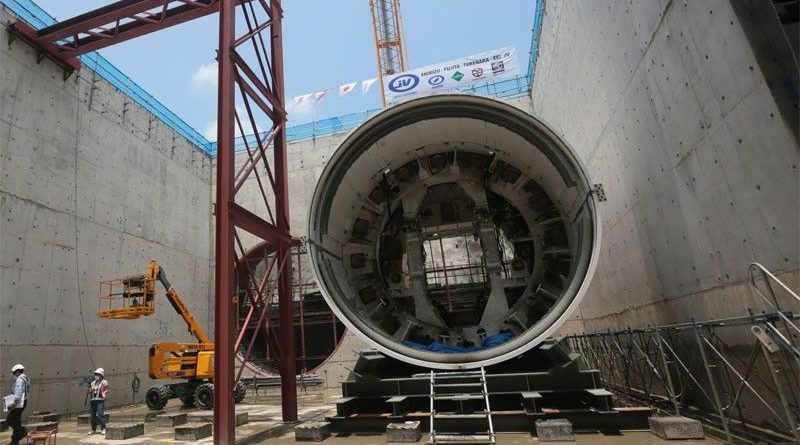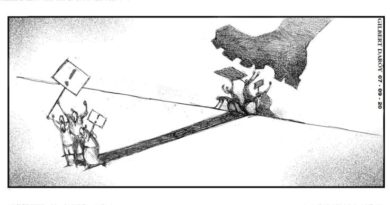HEADLINE | MANILA- The Philippines eyes more subway projects in NCR, Cavite
Workers present to the media the tail of the tunnel boring machine for the Metro Manila subway depot in Valenzuela during a site visit on June 13, 2022.

TOKYO – The Philippines is eyeing to build three or four more subway systems in Metro Manila and Cavite in partnership with the Japan International Cooperation Agency (JICA), Transportation Secretary Jaime Bautista said.
In an interview on the sidelines of the Philippine Business Opportunities Forum here on Friday, Bautista said feasibility studies are being prepared for the construction of more subways in the country.
“As early as now, we are already planning for more subways in Metro Manila because this will ease the traffic,” he told Manila-based journalists covering President Marcos’ official visit here.
“We are in the planning stage…that’s around three or four (subways)…Metro Manila to Cavite,” Bautista said.
At the forum, Bautista underscored the importance of building subways as a 2018 study by JICA showed that the Philippines loses over P3.5 billion a day due to heavy traffic.
The construction of the Metro Manila subway – the country’s first underground railway system – is funded by JICA under the official development assistance program.
On Thursday, Marcos and Japanese Prime Minister Fumio Kishida witnessed the signing of Exchange of Notes concerning the provision of a Japanese loan, worth 377 billion yen, for the development of the North-South Community Railway and its extension.
Metro Manila ranked 58th among 60 cities across the globe with the worst public transit systems based on the 2022 Urban Mobility Readiness Index released in November last year.
Meanwhile, Marcos met with executives of Japanese carmaker Toyota on Friday.
Marcos thanked Toyota officials for its plan to bring back the Tamaraw model in the Philippine market, calling it a dependable utility transport for many years for Filipinos.
“Many of the Tamaraws you’ve recently built are still on the road,” the Chief Executive told the officials of the Japanese carmaker, who described the Toyota Tamaraw as the company’s “workhorse.”
Marcos also said the Philippine government is looking at acquiring one model of the Toyota brand, the Mini-Cruiser, for the use of the military.
“It’s something we would like to revisit, simply because we have tried many utility vehicles for the military but they really [have] not been a success for us,” the President said.
Marubeni commitment
Also on Friday, a top official of Japanese trading and investment conglomerate Marubeni said they are set to increase investments in energy, water and transportation projects in the Philippines.
“Now, in addition to the traditional generation system, we are very much committed to increase renewable energy like mini hydro, solar and wind project and we are discussing with your country, our local partner to develop such kind of new facilities,” Marubeni chief executive officer Masumi Kakinoki told Marcos during a meeting.
The Marcos administration is setting a target for a higher share of renewable energy in the power generation mix of 35 percent by 2030 and 50 percent by 2040.
Kakinoki said the firm has also been involved in “providing water in the communities in the western part of Metropolitan Manila.”
“So, we’re very happy to be involved in this project also,” the Japanese business leader said.
Kakinoki also pledged to step up its partnership with the Philippine government in infrastructure-related business.
“We are very grateful to have (been) given such an opportunity to be involved in the basic infrastructure of your country,” he said.
Marubeni Corp. signed here on Friday a memorandum of understanding with the Department of Environment and Natural Resources, DMCI Holdings subsidiary Dacon Corp. and the University of the Philippines Los Baños College of Forestry and Natural Resources to develop a carbon credit program through reforestation.
Marcos, for his part, noted Marubeni’s “very, very high” profile in the Philippines.
“And we remember the many important infrastructure, energy, even agricultural products that Marubeni was involved in,” the President said.
Meanwhile, San Miguel Corp. president and chief executive office Ramon Ang, who is part of the Philippine business delegation to Tokyo, said many Japanese companies have expressed their admiration for Marcos and have shown strong interest in investing in the Philippines.
“There are several Japanese businessmen who want to invest in the Philippines. Of course we are just looking for good deals,” Ang told Filipino journalists.
“They are so impressed by our dear President and they were very energetic and all of them want to invest,” the Filipino business tycoon said.


 Memento Maxima Digital Marketing
Memento Maxima Digital Marketing Ads by: Memento Maxima Digital Marketing
Ads by: Memento Maxima Digital Marketing






